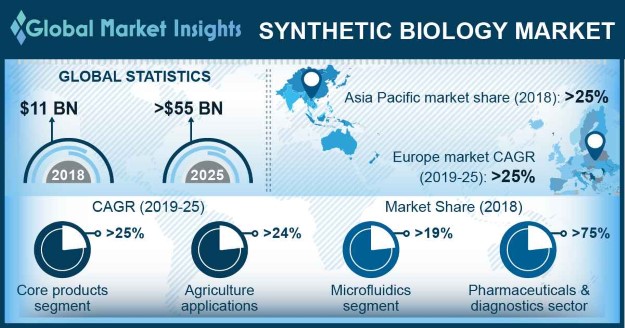Home > Food & Beverages > Processed Food > Synthetic Biology Market
Synthetic Biology Market Size
- Report ID: GMI3385
- Published Date: Jun 2019
- Report Format: PDF
Synthetic Biology Market Size
Global Synthetic Biology Market size exceeded USD 11 billion in 2018 and is anticipated to witness over 24% CAGR up to 2025. Strong applications outlook across various end use industries including agriculture, industrial chemicals, health care is set to drive synthetic biology industry growth.
Increasing investments in R&D activities supported by the government agencies will provide positive outlook for businesses across the global market. As per National Science Foundation, U.S. invested around USD 820 million from 2008-2014 and is estimated to be one of the largest investors in synthetic biology market globally. Similarly, UK invested over USD 330 million from 2008-2016 to promote the industry development. Factors such as optimized production process, improved access to renewable energy and reduced carbon footprints fuelling publicly funded synthetic biology projects worldwide.
| Report Attribute | Details |
|---|---|
| Base Year: | 2018 |
| Synthetic Biology Market Size in 2018: | 11 Billion (USD) |
| Forecast Period: | 2019 to 2025 |
| Forecast Period 2019 to 2025 CAGR: | 24% |
| 2025 Value Projection: | 55 Billion (USD) |
| Historical Data for: | 2014 to 2018 |
| No. of Pages: | 250 |
| Tables, Charts & Figures: | 185 |
| Segments covered: | Products, Technology, Application and Region |
Shifting production trends towards materials derived from natural plant products such as rubber, essential oils, food flavours and fragrances will support industry development. Increasing research activities with collaboration of science, technology and engineering to design, redesign, produce or modify living organisms, genetic materials, and biological systems will create new growth opportunities for industry participants over the forecast period.
Rising demand for biofuel as a result of global energy crisis, depletion of fossil fuels and increasing pollution will foster the synthetic biology market growth. Recent advancement in synthetic biology are paving the way for the fourth-generation biofuels production, where specially engineered microorganism/crops will serve as feedstock material. Increased worldwide per capita energy consumption owing to rapid industrialization with an upsurge in global population is likely to propel synthetic biology applications across energy sector.
Increasing concern pertaining to food security with growing population, changing climate and environmental stress will also boost the market demand. Synthetic biology aims to fulfil sustainable agricultural practices that allow minimal use of chemical fertilizers and pesticides along increased yield. Factors such as food production with better shelf life, higher and tailored nutritional or medicinal value will foster synthetic biology applications across food and agricultural sector. However, biosafety, biosecurity and ethical risk related to synthetic biology may hamper the business expansion.

